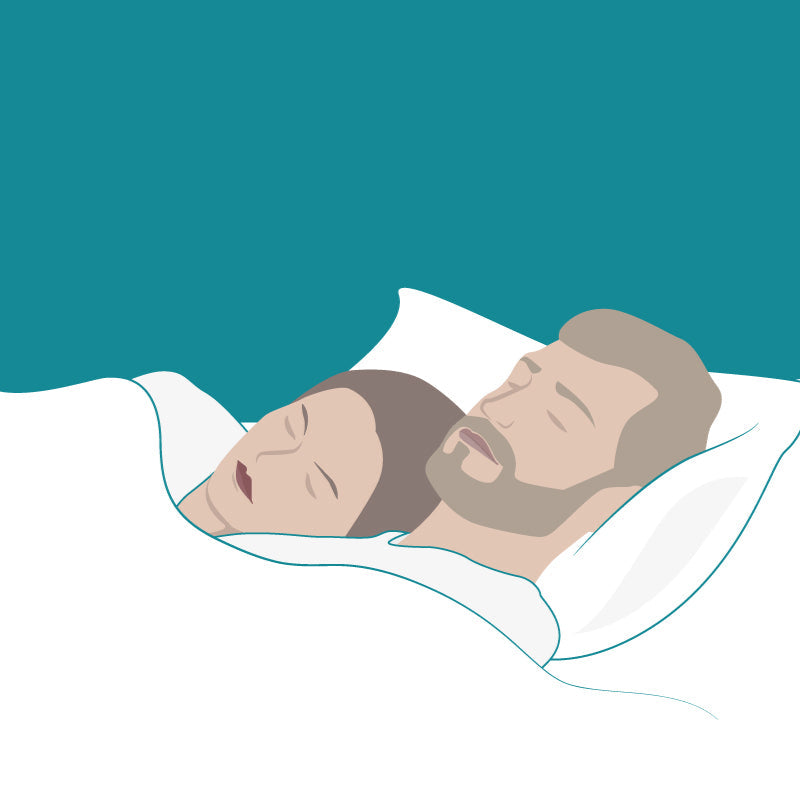Rund ein Drittel unseres Daseins verbringen wir im Schlaf. Dieser ist – neben einer gesunden Ernährung und ausreichender Bewegung – die wichtigste Säule der Gesundheit. Von ihm hängt unsere Leistungsfähigkeit und unser Level an Motivation und Energie ab. In unserem Ratgeber möchten wir Ihnen ein besseres Verständnis rund um das Thema Schlaf übermitteln und ein paar "gut temperierte" Tipps geben, wie man besser schläft.
Die wichtigsten Themen auf einen Blick:
1. Die verschiedenen Schlafphasen
Schlaf ist nicht gleich Schlaf – denn im Laufe der Nacht durchlaufen wir immer wieder verschiedene Schlafphasen, die unterschiedliche Aufgaben erfüllen…
2. Die richtige Schlaftemperatur
Für optimale Entspannung ist nicht nur das richtige Bett ausschlaggebend, denn die Schlaftemperatur kann einen großen Einfluss auf die Schlafqualität und den Komfort haben…
3. Häufige Schlafprobleme
Es gibt viele Dinge, die Ihre Nachtruhe stören können. Wenn Sie nachts immer wieder wach werden oder Probleme beim Einschlafen haben, kann das unterschiedliche Gründe haben…
4. Tipps für einen besseren Schlaf
Wenn Sie besser schlafen möchten, können Sie dafür so einiges tun. Mit unseren Tipps für einen besseren Schlaf können Sie Ihre Nächte noch erholsamer gestalten…
Mehr Informationen?


Die perfekte Temperatur für erholsamen Schlaf: Warum Raumtemperatur und Bettwaren entscheidend sind

Nächtliches Schwitzen bei Jugendlichen: Ursachen, Gründe und Lösungsansätze mit SleepCOOL
Besser schlafen: Was Sie über den Schlaf wissen sollten
Damit Sie nachts besser und ruhiger schlafen, ist es wichtig, dass Sie sich mit Ihrem Schlaf auskennen. Jeder Mensch hat unterschiedliche Bedürfnisse, Schlafgewohnheiten und Vorlieben, zum Beispiel in Bezug auf die Raumtemperatur. Dennoch gibt es einige grundlegende Dinge, die bei fast allen Menschen gleich sind. Wir informieren Sie hier über Themen wie die unterschiedlichen Schlafphasen, die optimale Schlaftemperatur, häufig auftretende Schlafprobleme und weitere Themen, damit Sie Ihren Schlaf noch gesünder gestalten und so letztendlich noch besser schlafen können.
Die verschiedenen Schlafphasen
Während wir schlafen, durchläuft der Körper gleich mehrere Phasen. Diese fangen bereits an, sobald wir die Augen schließen und die Einschlafphase beginnt. Anschließend geht diese über in die Leichtschlafphase. Diese lässt sich leicht erkennen, denn in dieser Phase können uns meist schon kleinere Berührungen oder Geräusche schnell wieder wecken. Sobald im Anschluss aber die Tiefschlafphase beginnt, ist dies nicht mehr der Fall. Wie der Begriff bereits vermuten lässt, gleiten wir hier in einen besonders tiefen Schlaf, der für unseren Körper sowie für den Kopf besonders erholsam und entspannend ist. Das macht die Tiefschlafphase zu einer der wichtigsten Phasen zum Energie tanken, und die Dauer der Tiefschlafphase pro Nacht im Schnitt nur bei etwa 1,5 bis 2 Stunden liegt.
Diese ersten Schlafphasen werden auch als Non-REM-Schlaf bezeichnet. Anschließend folgt die REM-Schlafphase, oder auch Traumschlafphase genannt. REM steht hier für Rapid Eye Movement, denn tatsächlich kann man bei Menschen in dieser Schlafphase beobachten, wie sich die Augen unter den Augenlidern immer wieder hin und her bewegen. In dieser Phase träumen wir und verarbeiten die verschiedenen Eindrücke des Tages, was die REM-Schlafphase besonders wichtig macht, denn nur mit einem guten REM-Schlaf kann unser Gehirn so funktionieren, wie es soll. Ein Schlafzyklus inklusive aller Schlafphasen dauert etwa 90 Minuten.
Die richtige Schlaftemperatur
Einer der wichtigsten Aspekte für einen ausreichenden und erholsamen Schlaf ist die richtige Schlaftemperatur. Sowohl eine zu hohe als auch eine zu niedrige Temperatur können den Schlaf stören, die Schlafphasen durcheinander bringen und so dafür sorgen, dass Sie nachts keine ausreichende Entspannung und Erholung erfahren. So kann es bei zu hohen Temperaturen zum Beispiel zu Nachtschweiß führen, während niedrige Temperaturen unter anderem dazu führen können, dass Sie frieren oder nachts kalte Füße bekommen. Aus diesem Grund ist es sinnvoll, die Temperatur im Schlafzimmer entsprechend zu regulieren.
Nicht nur die Temperatur im Schlafzimmer, sondern vor allem auch Ihr Bettzeug und Ihre Bettwäsche können einen großen Einfluss darauf haben, wie gut Sie schlafen. Sind diese aus dem falschen Material, kann dies zum Beispiel Nachtschweiß begünstigen. Besonders gut geeignet ist hingegen Bettwäsche aus Tencel, welches auch als Lyocell bekannt ist. Das spezielle Material kann wesentlich mehr Feuchtigkeit aufnehmen, als beispielsweise Baumwolle, sodass sich mit Bettzeug aus Lyocell nächtliches Schwitzen verringern und so auch Ihr Schlaf verbessern lässt.

Einfach besser schlafen - packen Sie es an!
Sie finden nachts nicht zur Ruhe oder leiden unter Nachtschweiß? Dann können unsere temperaturregulierenden Bettwaren Abhilfe verschaffen.
Häufige Schlafprobleme
Fast jeder Mensch leidet irgendwann einmal unter Schlafproblemen oder Schlafstörungen. Manchmal können diese spontan auftreten und von ganz alleine wieder verschwinden, wie es zum Beispiel bei Schlaflosigkeit häufig der Fall ist. Andere Male bleiben sie über einen längeren Zeitraum bestehen und lösen sich nicht von selbst. Solche Durchschlafprobleme können viele unterschiedliche Ursachen haben, wie zum Beispiel gesundheitliche Gründe, Stress oder auch äußerliche Faktoren, die die Nachtruhe negativ beeinflussen.
Gerade Stress und psychische Belastung können schnell zu unruhigem Schlaf und damit zu einem allgemeinen Schlafmangel führen. Hier ist es natürlich besonders wichtig, die Ursache selbst zu bekämpfen und zu versuchen, den persönlichen und beruflichen Stress zu verringern oder sich eventuell auch von einem Arzt oder einer Ärztin beraten zu lassen, damit Sie so schnell wie möglich wieder problemlos durchschlafen und Ihre Schlafqualität verbessern können.
Auch nächtliches Schnarchen kann zur Schlafstörung werden – und das nicht nur für diejenigen, die neben einer schnarchenden Person schlafen. Zwar ist schnarchen nicht grundsätzlich immer ein Problem, dennoch kann es in manchen Fällen gesundheitliche Probleme mit sich bringen. Falls Sie nachts schnarchen und feststellen, dass Sie vermehrt aufwachen, da Sie unter Herzrasen leiden, ist Vorsicht geboten. Dies kann sowohl auf eine Schlafapnoe als auch auf andere gesundheitliche Probleme hinweisen. Auch wenn Sie nachts immer häufiger zur Toilette müssen, kann dies ein Anzeichen dafür sein, dass das Schnarchen zum Problem geworden ist. Spätestens dann, wenn Sie sich tagsüber ständig ausgelaugt und müde fühlen, ist es eindeutig, dass das Schnarchen zu einem ernstzunehmenden Schlafproblem geworden ist. Ist dies der Fall, sollten Sie in jedem Fall einen Arzt aufsuchen und mögliche Optionen gegen das Schnarchen und dessen Ursachen besprechen.
Tipps für einen besseren Schlaf
Wenn Sie besser schlafen möchten, müssen Sie nicht tatenlos bleiben. Tatsächlich gibt es einige Dinge, mit denen Sie Ihre Schlafhygiene aktiv verbessern und für mehr nächtliche Ruhe und Entspannung sorgen können. Dazu gehören verschiedene natürliche Einschlafhilfen sowie die optimale Schlafumgebung, mit der Sie nicht nur besser einschlafen und nachts mehr Ruhe finden, sondern auch tagsüber mehr Energie genießen können. Um Ihnen einen rundum guten Schlaf zu ermöglichen, finden Sie hier unsere Tipps zum Einschlafen.
Guter Schlaf spielt eine große Rolle, wenn es um unsere Gesundheit und das allgemeine Wohlbefinden geht. Aus diesem Grund ist es besonders wichtig, für die eigene Nachtruhe die idealen Bedingungen zu schaffen und Schlafprobleme frühzeitig zu behandeln.
Bettwaren, die für die perfekte Temperatur sorgen
Das optimale Schlafklima im Bett können Sie positiv durch atmungsaktive SleepCOOL.-Produkte beeinflussen. Temperaturregulierende SleepCOOL.-Bettwaren sorgen für ein optimales Zusammenspiel von Körper, Temperatur und Feuchtigkeit. Das Mikroklima auf der Haut wird positiv beeinflusst, Schwitzen und Frieren werden reduziert (s. auch nähere Erläuterung zu Phase-Change-Material (PCM). Noch mehr Hintergründe zu thermodynamischen Gesetzmäßigkeiten erfahren Sie hier.
Nehmen Sie ein heißes Bad
Ein gemütliches Bad erhöht Ihre Körpertemperatur ein wenig. Wenn Sie herauskommen, kühlen Sie recht schnell ab, was den natürlichen Prozess des Einschlafens nachahmt. Wenn das Gehirn den Körper auf das Schlafen vorbereitet, fällt die Körpertemperatur auf natürlichem Wege. Für die Wirksamkeit gibt es eine physiologische Erklärung: Durch die Bäder werden die peripheren Gefäße erweitert, was die Körperkerntemperatur senkt. Dieses auch physiologisch am Abend auftretende Absinken der Körpertemperatur wird als starker Einschlafreiz empfunden. Ein warmes Bad hilft also nicht nur, schneller einzuschlafen, sondern auch besser zu schlafen, wie mehrere klinische Studien belegen.

Vermeiden Sie kalte Füße
Frauen leiden oft unter kalten Füßen – und die sind ein echter „Killer“ für den guten Schlaf. Ein guter Einschlaftipp ist ein warmes Fußbad: Das fördert die Durchblutung und wirkt zusätzlich noch gut zur Entspannung und gegen Unruhe. Was auch noch helfen kann: Ziehen Sie Socken im Bett an.

Vermeiden Sie kalte Duschen
Vermeiden Sie (besonders bei warmen Außentemperaturen) eine kalte Dusche vor dem zu Bett gehen. Das kalte Wasser führt dazu, dass sich die Gefäße zusammenziehen, so kann Wärme nicht so gut aus dem Körper transportiert werden. Besser funktioniert eine warme Dusche, am besten sind jedoch Wechselduschen, erst kühl dann warm.
In heißen Sommernächten: Wenn Sie sich auf Grund von hohen Temperaturen erschöpft und matt fühlen und deshalb nicht schlafen können, dann gehen Sie ins Badezimmer und halten Sie den Puls beider Hände ein bis zwei Minuten lang unter laufendes, kaltes Wasser. Sie werden staunen, wie angenehm das ist und wie gut Sie danach einschlafen.

Führen Sie ausreichend Flüssigkeit zu
In heißen Sommernächten sollte man, wenn man nicht schlafen kann, Flüssigkeit zuführen. Man sollte trinken, auch wenn man keinen Durst verspürt. Ideal sind Melissentee, Hibiskusblütentee sowie weitere Teesorten oder aber Wasser mit etwas Zitronensaft. Im besten Fall sollten diese ungesüßt und nicht eiskalt, sondern in Zimmertemperatur genossen werden.









